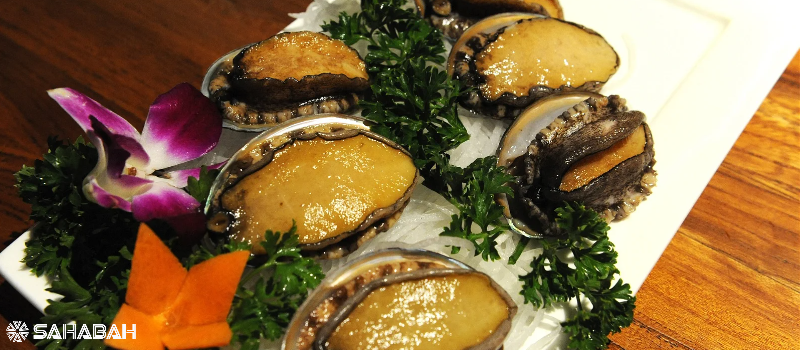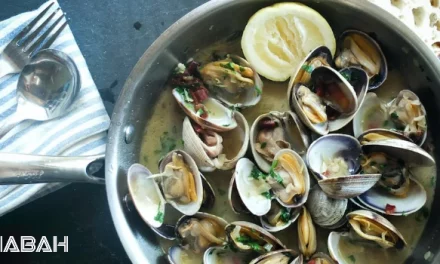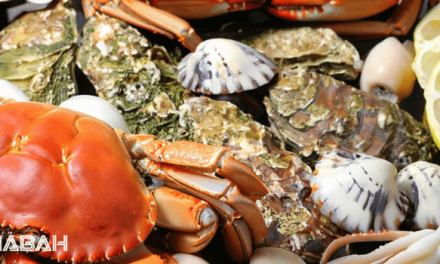Abalone is growing in popularity globally, especially in fine dining and Asian cuisines. However, many Muslim consumers have an important question: is abalone halal? This comprehensive guide analyzes abalone’s halal status according to Islamic dietary law.
What Does Halal Mean?
The Arabic word “halal” essentially means permissible, lawful or legal. The opposite of halal is “haram”, meaning prohibited or forbidden.
For any meat or seafood product to be certified halal, it must meet the following conditions:
- It does not contain any ingredients that Islamic law expressly prohibits
- The animal was slaughtered according to zabiha guidelines stated in the Quran
- It is processed safely and hygienically
Adhering to halal dietary restrictions is an important aspect of practicing Islam for many Muslims. This applies not only to which foods they eat, but also how they source, purchase, handle and prepare them.
Why Halal Certification Matters
Halal certification ensures Muslims that products meet specific standards in accordance with their religious beliefs. It covers aspects ranging from:
- Animal welfare in breeding and slaughter
- Ingredients used in processing
- Prevention of contamination with haram substances
- Proper packaging, storage and transportation
Globally, the halal food industry is now valued at over $2 trillion. Halal certification allows producers to tap into this demand from 2 billion Muslim consumers worldwide who actively seek halal products.
For individual Muslim consumers, halal logos on seafood provide assurance that consuming it does not go against their faith. This gives them peace of mind.
Factors Determining If Abalone Is Halal
The core debate around abalone’s halal status depends on two key factors:
- Whether it is classified as carnivorous or herbivorous: Carnivorous sea creatures are typically considered haram in Islam. Meanwhile, herbivorous seafood that feed only on plant-matter are usually permissible.
- Its natural diet and feeding patterns: The types of food abalone consume influences Islamic rulings on its permissibility.
Examining these two factors in detail is crucial to understanding conflicting stances on the halal status of abalone.
Is Abalone Considered Carnivorous?
The biggest contention is whether abalone falls under carnivorous or herbivorous sea animals from an Islamic law standpoint.
Evidence of Abalone’s Herbivorous Classification
Abalone do not prey on other animals and primarily survive on a plant-based diet, consisting of seaweed and algae they graze on. They are widely classified as herbivores:
- “Abalone are known to be herbivores that feed mainly on seaweed.” Encyclopedia Britannica
- “Abalone are herbivores, feeding mostly on macroalgae.” Monterey Bay Aquarium
Additionally, numerous halal certification bodies explicitly state that abalone are permissible for Muslim consumption:
- “Abalones are halal and permissible.” JAKIM Halal Hub
- “Abalone is Halal.” SANHA Halaal Helpline
- “It is permissible for Muslims to consume abalone.” Chicago Halal Expo
This evidence indicates abalone’s lack of carnivorous tendencies. As herbivores that feed only on sea vegetation, most Islamic scholars include abalone among permissible seafood.
Counter-Arguments Against Abalone Being Herbivorous
However, some organizations and individual Muslim religious authorities argue otherwise, stating that abalone fall under carnivorous crustaceans that are prohibited for Muslims.
Reasons cited include:
- Abalone have a fleshy muscle structure similar to carnivorous shellfish like oysters, lobsters and scallops which are haram
- Lack of definitive ruling from supreme halal certification bodies
- Abalone shells can trap residues of non-halal substances consumed by them
So contrary fatwas do exist, adding to the confusion over abalone’s disputed halal status for observant Muslims.
What is Abalone’s Natural Diet?
Analyzing the types of food abalone actually consume helps clarify the herbivorous vs carnivorous distinction in Islamic deliberations.
Details of Abalone’s Feeding Patterns
Research into abalone’s diet reveals:
- Abalone are marine grazers that scrape algae off rocks using their rasp-like tongue
- Their natural diet is composed almost entirely of seaweed and kelp
- Abalone farms specifically cultivate seaweed to feed abalone being farmed commercially
This corroborates arguments that abalone display herbivorous tendencies, lending weight to opinions of Islamic experts permitting Muslims to eat abalone.
Counterview Point: Abalone May Consume Shellfish
However, one counterview states that small shellfish can sometimes become trapped in abalone shells as they move along rocks.
If true, abalone could ingest shellfish residues, rendering their halal status questionable according to some strict interpretations.
For this reason, thorough cleaning of the abalone shell is necessary to avoid potential haram contamination before cooking the abalone meat.
Varying Perspectives Among Muslim Denominations
In Islam, various schools of legal thought have differing views on the halal-haram classification of certain animals like abalone. This affects whether Muslims view abalone consumption as religiously permissible.
Hanafi School’s Stance on Abalone
The Hanafi school, largest of the four major Sunni denominations, debates abalone’s halal status extensively:
- According to Hanafi scholars, abalone are makruh tanzihi (disliked) rather than outright haram
- But they recommend avoiding abalone to be cautious since its underwater diet is unclear
- Prominent Hanafi Shariah bodies like Darul Ifta Birmingham rule it impermissible
So the Hanafi position remains doubtful regarding abalone being halal.
Other Denominations More Lenient
Meanwhile, the Shafi’i, Maliki and Hanbali schools lean towards deeming abalone as halal seafood for Muslims:
- They base this on abalone’s primary herbivorous diet patterns
- These denominations also consider similarity to lobsters irrelevant in proving abalone’s carnivorous status
Their legal interpretations offer more flexibility for Muslims wanting to sample abalone meat.
Public Positions of Certification Bodies
Globally, various halal advisory committees deliberate extensively on classifying the halal-haram status of food products. Where do major halal certification organizations stand on the abalone debate?
Malaysia’s JAKIM Allows Abalone Consumption
Malaysia’s Department of Islamic Advancement (JAKIM) is considered an influential voice regarding halal standards.
On their halal hub site, JAKIM states unequivocally:
“Abalones are halal and permissible.”
As Malaysia’s national halal certification body, JAKIM’s position bolsters the case for abalone being halal.
Contradictory Stances Among Halal Cert
However, conflicting perspectives still emerge among different halal advisory organizations.
For example:
- South Africa’s SANHA Halaal association clearly asserts “Abalone is Halal”
- But Australia’s Supreme Islamic Council declares they “do not certify any abalone as halal” due to lingering doubts
So no consensus exists, even among prominent halal certification groups.
Why So Much Confusion Around Abalone’s Halal Status?
Clearly, confusion and contention persists among Islamic scholars regarding the halal classification of abalone. What factors account for such ongoing debate?
Differing Interpretations of Islamic Law
Most issues stem from differing schools of thought offering separate interpretations of Shariah law concerning seafood consumption. These interpretive differences have persisted within Islam for centuries.
Key areas of debate involve:
- Which specific traits make a sea creature carnivorous vs herbivorous
- Parameters determining impermissibility of unusual sea animals not covered explicitly in Quranic texts
- Validity of classifying creatures based on appearance or taste similarities with other established haram products
This shows why equally knowledgeable Muslim religious authorities derive opposing halal conclusions about the same abalone species.
Practical Considerations Around Abalone Consumption
Additionally, some objections originate from concerns around real-world handling of abalone products:
- Abalone flesh appearance resembles shellfish texture, causing confusion
- Lack of dedicated abalone-only processing facilities raises cross-contamination risk
- Not washing abalone shell properly can cause haram residues to mix with meat
These genuine issues likely contribute towards conservative stances deeming abalone haram, even while accepting its likely herbivorous nature.
What Are the Best Practices for Muslims Regarding Abalone?
When sourcing and eating abalone products, what precautions should Muslims concerned about halal status take?
Seek Out Certified Halal Abalone Products
The simplest solution is for Muslim consumers to actively check for halal certification logos when buying commercially sold abalone meat or canned abalone:
Purchasing pre-certified halal abalone provides full assurance abalone’s permissibility according to Islamic law. Moreover, halal companies adhere to additional protocols ensuring hygienic processing and preventing cross-contamination.
Of course, this depends on finding availability of certified halal abalone products locally. But increasing global demand for halal foods is improving accessibility to such specialty products.
Properly Clean Abalone Shell Before Cooking
When preparing fresh unprocessed abalone personally, properly cleaning the shell is vital:
- Soak abalone shell in water for 30 minutes to loosen residue remains
- Scrub interior and exterior shell surfaces thoroughly using a brush
- Remove abalone meat completely from shell before cooking
This greatly minimizes the small risk of shell remnants somehow transmitting haram elements to the permissible abalone meat.
Verify Menu Items When Dining Out
If eating abalone meat at restaurants, diligently check that:
- Abalone dish explicitly listed as halal certified
- No cross-contamination from haram ingredients during preparation
- It is fully cooked according to Islamic guidelines
Can Muslims Enjoy Abalone in Good Faith?
Based on most evidence around abalone’s herbivorous diet and feeding patterns boosting its halal credentials, combined with halal certifications specifically covering abalone, Muslims can reasonably enjoy abalone in good faith.
Of course, individual Muslims should make their personal halal determinations based on their own understanding and interpretation of Shariah laws.
But the mainstream consensus tilts towards classifying abalone among permissible seafood, especially with proper handling procedures. So for most Muslim consumers, consuming abalone likely aligns with religious obligations around upholding halal dietary restrictions.
Frequently Asked Questions: Is Abalone Halal?
According to Islamic dietary laws, abalone is halal. It is considered halal because it is a type of seafood, which is permissible to eat in Islam.
Is abalone considered meat?
Abalone is not considered meat. It is a type of seafood that is similar to scallops. It is often referred to as a shellfish.
Can I find canned abalone in stores?
Yes, you can find canned abalone in some stores. It is a popular ingredient in Chinese cuisine and is often used in dishes like abalone sauce.
Is abalone a type of fish?
No, abalone is not a type of fish. It is a marine mollusk that belongs to the same family as snails and clams.
Are there any apps that can help me find abalone recipes?
Yes, there are several apps available that can provide you with abalone recipes. You can search for them in your preferred app store.
Is abalone considered a healthy food?
Abalone is often regarded as a healthy food choice because it is low in fat and high in protein. It also contains beneficial minerals like iron and calcium.
Is abalone a suitable choice for a frozen seafood dish?
Yes, abalone can be used in frozen seafood dishes. However, it is important to ensure that the abalone is properly stored and thawed before cooking.





